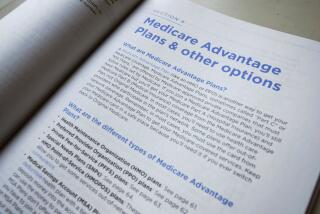Penalty Phase Kicks In After May 15
WASHINGTON — There’s a cost to procrastination.
For Medicare beneficiaries who fail to sign up for the drug benefit by the May 15 deadline, the late-enrollment penalty starts small but grows considerably in just a few years.
The penalty is one of the least-understood aspects of a confusing program. Many seniors are exempt from the penalty, including those who already have coverage from another source that is as good or better than Medicare’s.
The same is true for those who are still working, have coverage through an employer plan and are not collecting Social Security or participating in Medicare.
Still, for those who are not sure where they stand, it’s important to check.
The formula for calculating the penalty is 1% of the national average monthly premium, multiplied by the number of months that a senior has delayed enrolling.
Because the national average premium increases every year, the amount of the penalty will keep rising as long as a tardy beneficiary remains in the program.
Another Medicare coverage -- Part B for outpatient services -- also has a costly penalty for late-enrollment penalty.
Here are some examples of how the penalty in the drug benefit works:
Suppose a senior misses the May 15 deadline but decides to sign up for coverage at the end of this year, starting Jan. 1, 2007. For 2007, the national average premium is estimated to be $35.85. The monthly penalty would be 1% of $35.85 multiplied by seven penalty months. (The penalty clock starts June 1, the effective date of coverage for persons who sign up by May 15.) It works out to a little more than $2.50 a month, or about $30 for the whole year.
That may not sound like a lot, except that with some plans in the Los Angeles area currently offering monthly premiums less than $6, the same $30 could buy at least five months of coverage now.
What’s more, the beneficiary who signed up by May 15 would never face the prospect of having to pay a penalty.
And that could be really important, because the Bush administration and Congress designed the penalty to increase with time.
For example, a senior who is eligible now but delays signing up for three years -- until the end of 2009 -- would face a substantial penalty equal to 43% of the monthly premium.
Because the premium for 2010 is estimated to be $42.39 per month, the penalty would work out to about $18 a month, or $216 a year.
Even at $4 a pill, that’s enough to buy a lot of Lipitor.
More to Read
Inside the business of entertainment
The Wide Shot brings you news, analysis and insights on everything from streaming wars to production — and what it all means for the future.
You may occasionally receive promotional content from the Los Angeles Times.










